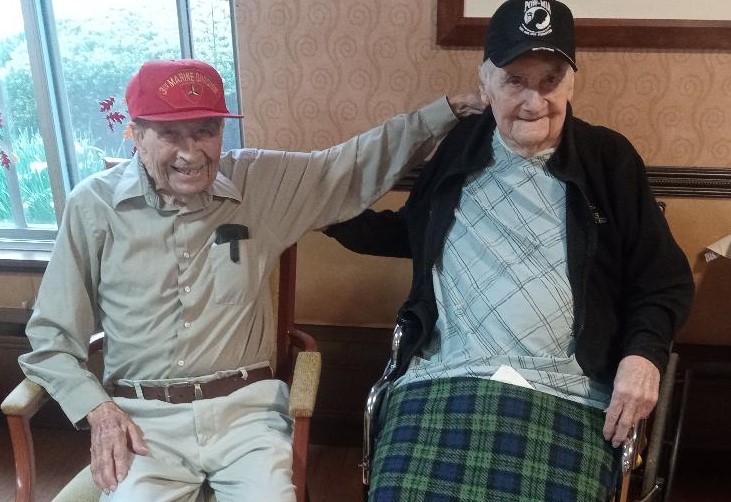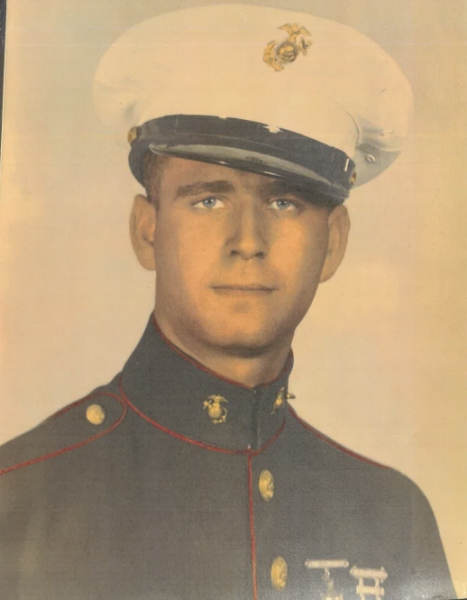
ROCHESTER - World War II Army veteran and POW Ed Parker took a blast of shrapnel to the face during the Battle of Anzio Beach, where 7,000 Americans died in combat as the allies pushed north toward Rome beginning in January 1944.
World War II Marine Cpl. Constantine Chrysafidis saw his leg half blown off when he was shot in the leg in the Battle of Iwo Jima, where 6,800 Americans lost their lives.
These two World War II heroes, members of the Greatest Generation, who fought in two of WWII's most horrific and bloody battles, will be honored as Grand Marshals in Rochester's Memorial Day Parade on Monday.
Relaxing in a common area of the Rochester Manor nursing home earlier this month, the two American heroes, who share a room at the facility, talked with The Rochester Voice about their times on the battlefield and their feelings about being honored on Memorial Day.
Parker, a sergeant, turned 100 in April, while Chrysafidis turns 100 in August.
Parker, who grew up in New Hampshire, said when he stepped onto Anzio Beach from a landing ship there was no resistance, but that didn't last long.
"The first 10 days were OK, but we had no backup," he said. "The fleet backing us up offshore began to thin out, cause they were sending a lot of the ships up to England getting ready for D-day.
"When that happened it came to a standstill. It was trench warfare with the Germans. Everyone on our side got hit hard."
Sometime later amid the chaotic fighting and skirmishes, he was working point one day when an artillery round landed right in front of him spraying shrapnel in his face. When re regained consciousness, his face stinging like needles, he saw a dozen German soldiers surrounding him.
He was taken prisoner and sent to a work camp where he was basically performing slave labor, he said, unloading and loading trucks and trains to the point of exhaustion.
"I don't even know how long I was there, because there were no clocks, no calendars, Lost track of time," he said. "All I know is that I got so weak I couldn't do the labor that well, and one day they put me on a train with a bunch of other prisoners to go someplace else. It wasn't looking good if you know what I mean."
The smallish rail cars that were carrying them to that unknown location were known as 40X8's, because they could carry 100 men or eight horses, he said.
Desperate to escape the train and his likely demise at the train's final destination, Parker and fellow inmates hatched a plan to escape through a small window that was covered in barbed wire.
During a nighttime stop with machine-gun armed Germans stationed on the roof the train and floodlights panning back and forth from railcar to railcar, they managed to somehow remove the barbed wire and escape through the window.
"We had it all planned, we were all gonna go out one at a time," he said. "I crawled out first and then the second guy got out, but then the Germans that were stationed between every other car began to open up on us."
He said the third and fourth soldiers are believed to have been killed by the Germans, but many years after the war he learned that the fifth guy had also survived. He doesn't know what happened to the rest.
After his escape he spent months in the Italian underground with partisans (the resistance) who helped keep him safe.
The partisans were Nazi haters and kept Parker protected. During this time he want on several forays with the resistance who blew up German army facilities and power lines and other facilities whenever they could.
"This one partisan I worked with, he was a real fighter," Parker said. "He hated the Germans. Whenever he blew up a German facility - he would always say in a thick German accent, 'Dat was a gute one!'" he quipped.
After several months being sheltered by the partisans, during which time he became sick with malaria, he was finally able to make his way back to the allied lines where he was rescued by English troops.
Parker said he never felt so exhilarated as when he knew he had reached safety.
"When you get back to Allied territory it's like being born again," he said. 'I'd been hunted like an animal for months. When I got back to where I was safe, all I could say was 'Phew!"'
* * *
Chrysafidis, a corporal in the Marines, said he was 18 when he left a high school in Kentucky to join the Marines in November 1942,
"I walked into school one day and I see sign, 'Uncle Sam Wants You,' he said in his thick Greek accent, "so I sign up."
Chrysafidis, who fought in the Battle of Iwo Jima, said that when they headed to shore in landing boats, there was only one beach, so they were all packed close together when they jumped ashore.
"Right away I see two dead Marines to my left and I yelled, 'Spread out.'"
There was barbed wire between the beach and the countryside, so we cut through the wire, and two would hold back the wire on each side so we could get through, he said.
 |
| Marine Cpl. Constantine Chrysafidis in WW II uniform (Courtesy) |
"A lot of the guys that were holding the barbed wire got killed," he added said grimly.
Not long after the Seabees got on shore and started using their equipment to give cover as troops made it off the beachhead and began an offensive.
"We were so lucky to have the Seabees," he said.
Once they were able to get into the countryside their orders were to go and secure a nearby airfield.
"All the while they were attacking us," Chrysafidis said. "When it got worse we dug a foxhole. It took us six hours."
He said all through the night they had to fend off attackers, seeing some of their comrades getting killed or injured, while they also killed many of the enemy.
He said thankfully, the troops behind them and ships offshore, "kept the area of battle as light as day" with constant flares lighting up the sky.
"After all the shelling stopped the Japanese forces began to infiltrate," he said.
One Japanese soldier was able to get near enough to him to shoot him in the leg. A split second later Chrysafidiis said he managed to return fire and kill him.
"When I looked down I thought I'd lost my leg and passed out," he said.
When he came to, he said he saw a "big face" standing over him.
"I almost shot him, then I realized it was an American," he whispered.
As an American unit carried him from the foxhole he realized he hadn't lost his left leg, but It was split open from ankle to above the knee.
Chrysafidiis had to go through several operations over a year's time to recover and still suffers from permanent never damage.
Both men said they risked their lives for one thing. Looking at his roommate, Parker said, "Freedom."
Asked about what they thought about the way things are going in our country today, Parker paused for a moment.
"I think a lot of countries are in their own turmoil," he said quietly. "We haven't won a war since World War II."
"I agree," said Chrysafidis, "Back during Vietnam War we had a $3 million deficit, now it's $1.8 trillion.
Despite their fears about the future of our country, they remain steadfast in their love for the country, and proud of their service and sacrifice they did for America.
They've been in many Memorial Days in recent years, but Parker, especially is looking forward to this year's in Rochester.
"Last year I was in a wheelchair, and while the guy pushing me was vert careful to avoid storm drains, I felt every bump ...
"This year we'll be in a golf car," he added with a grin.













